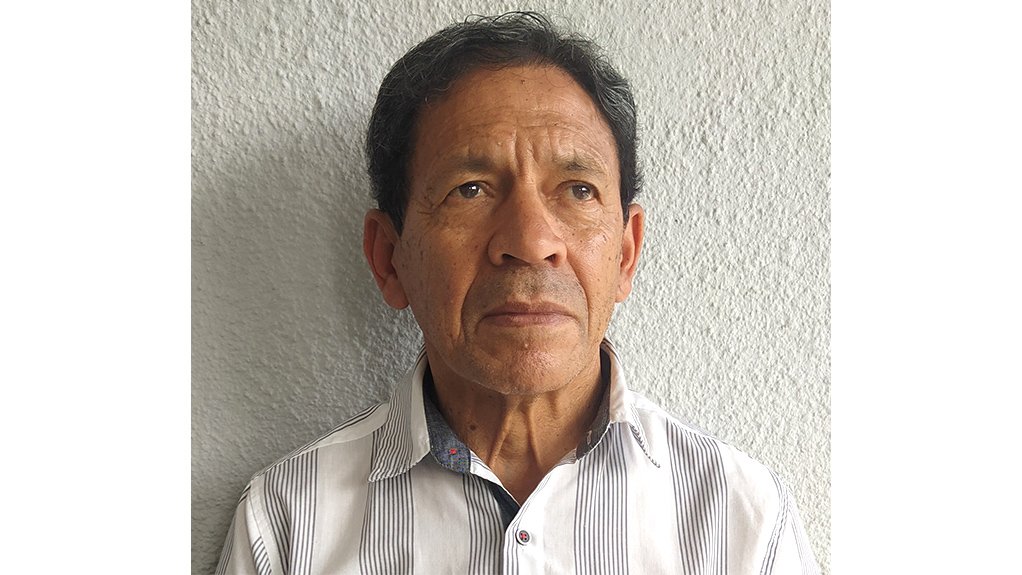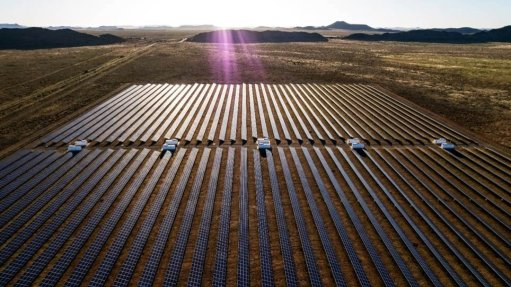Just Transition requires a whole-of-society approach


EUGENE CAIRNCROSS South Africa has an abundance of high-quality renewable energy resources but deployment has been slow
The South African economy is dependent on fossil fuels for its energy needs. Therefore, a “Just Transition” requires a whole-of-society approach, says chemical engineering Emeritus Professor Eugene Cairncross – formerly at the Cape Peninsula University of Technology and working with the Life After Coal campaign.
Life After Coal is a joint campaign by nonprofit environmental organisations Earthlife Africa Johannesburg and groundWork, along with non-profit environmental rights law firm Centre for Environmental Rights.
Cairncross explains that in 2019, electricity utility Eskom burnt 109 000 t of coal, 426-million litres of diesel and used 270 736-million litres of water to produce 195 685 GWh of electricity, 91% of the 215 000 GWh produced. As a result, it emitted 213 000 t of carbon dioxide (CO2).
Road transportation consumed 12.9-billion litres of diesel and 10.8-billion litres of petrol, emitting a combined 59 000 t of CO2. South Africa’s coal-to-liquids plant consumed 39 000 t of coal to produce petrol and diesel, emitting 48 000 t of CO2. In 2019, these three sources were responsible for the emission 322 000 t of CO2, 80% of South Africa’s total of 400 000 t. Fossil fuel combustion in the energy sector, road transportation and industries is also responsible for most air pollutant emissions, exposing more than 90% of the population to unhealthy air, causing death and disease.
Access to energy is skewed, with 12% of households, or 2.1-million households, burning highly polluting, unhealthy and dangerous wood, paraffin or coal for household energy needs, emitting about 9-million tonnes of CO2 a year. About 40% of the population is not connected to electricity or cannot afford the equitable use of available power, outlines Cairncross.
Technological solutions to decarbonise the South African economy must be available at sufficient scale to replace fossil-fuelled energy systems within the timeframe of the climate goals. Competing technologies must consider the cost of deployment and non-deployment of zero-CO2-emissions alternatives, the avoided costs of death and illness owing to fossil-fuel emissions, the positive and negative social costs and the impact on formal and informal employment.
Decarbonising the Electrical Power System
Cairncross says that South Africa has an abundance of high-quality solar and wind renewable energy resources which yield competitively priced energy, but renewable energy deployment has been slow.
By March 2021, 5 078 MW of solar and wind energy projects were in operation, contributing 12 821 GWh, which is only 6% of annual energy needs.
Bid Window 5 (BW5) of the Renewable Energy Independent Power Producer Procurement Programme, for the procuring of 2 600 MW of power by Eskom, resumed the deployment of renewable energy after a controversial forced hiatus in the programme, yielding average solar and wind tariffs of R466.97/MWh and R491.60/MWh respectively in October 2021. The lowest bids are 26% and 20% respectively lower than the marginal cost (for coal, water, diesel) of Eskom’s coal-based power of R464/MWh.
Bid Window 6 (BW6), for 4 200 MW, received bids by the October 2022 deadline for a total capacity of 9 666 MW. The future deployment of solar and wind will reduce generation costs by displacing higher marginal-cost existing coal-based power. The oversubscription of BW6 shows that a renewables deployment rate of 6 000 MW/year (16 000 GWh/year) is achievable. At 6 000 MW/year, 50% of current fossil-fuels-based power could be displaced by 2030, rising to 100% by 2035, Cairncross says.
Beyond 2035, large-scale renewable energy deployment must be reassessed against interacting factors, including increasing demand as universal equitable electricity access is achieved, the electrification of road transportation, energy efficiency initiatives, the deployment of distributed small-scale solar, and energy security. A renewables-based system requires the redesign and development of the national grid, mini-grids for isolated communities, and energy storage, including batteries and pumped hydro.
Solar photovoltaic (PV) technology facilitates new ways of conceptualising and decentralising energy generation, including community and municipal-based own generation and on-site generation for electric vehicle (EV) recharging stations. Innovative agri-PV systems could be used to enhance crop production and solar generation.
The development of upstream renewable energy industries is possible, placing these industries at the core of reindustrialisation and job creation, says Caircross. A Just Transition demands prioritisation of investment in these and other employment-generating activities, particularly in areas affected by power plant closures.
Decarbonising the Road Transport System
South Africa’s vehicle parc includes a mix of petrol- and diesel-powered vehicles.
The rapid development of battery electric vehicles (BEVs) over the past few years has resulted in the commercial deployment in China of a spectrum of EVs, from small cars to luxury passenger vehicles, light delivery vehicles, commercial trucks, and electric busses.
Chinese EV sales exceeded 2-million in 2021 while global EV sales reached 6.75-million units, 8.3% of the light vehicle market. Only electrified heavy-duty and long-haul trucks have not yet been deployed at scale, but this is likely to happen by 2024. In 2021, just 15 500 hydrogen fuel cell vehicles were sold globally.
BEVs are three times more energy efficient than fossil-fuelled cars, with lower maintenance costs. Life-cycle costs are already lower than those of fossil-fuelled vehicles. This will drive the rapid adoption of commercial EVs once they become available.
The decarbonisation of road transport through electrification, although inevitable, will be extremely disruptive and economically damaging unless properly planned and managed.
The current minibus taxi commuter system exacts a disproportionate daily cost on workers and the poor. It must be transformed, not simply electrified, avers Caircross. South Africa’s vehicle and component manufacturing industries, maintenance and fuel distribution infrastructure are at risk of severe disruption, threatening the jobs and livelihoods of hundreds of thousands of workers.
The incumbent European, Japanese and American internal combustion engine (ICE) petrol and diesel vehicle manufacturers in South Africa have not adopted a global strategy of electrification. Technology partners for establishing new EV and battery manufacturing plants are more likely to be new EV manufacturers unencumbered by huge ICE manufacturing assets, Cairncross concludes.
Article Enquiry
Email Article
Save Article
Feedback
To advertise email advertising@creamermedia.co.za or click here
Press Office
Announcements
What's On
Subscribe to improve your user experience...
Option 1 (equivalent of R125 a month):
Receive a weekly copy of Creamer Media's Engineering News & Mining Weekly magazine
(print copy for those in South Africa and e-magazine for those outside of South Africa)
Receive daily email newsletters
Access to full search results
Access archive of magazine back copies
Access to Projects in Progress
Access to ONE Research Report of your choice in PDF format
Option 2 (equivalent of R375 a month):
All benefits from Option 1
PLUS
Access to Creamer Media's Research Channel Africa for ALL Research Reports, in PDF format, on various industrial and mining sectors
including Electricity; Water; Energy Transition; Hydrogen; Roads, Rail and Ports; Coal; Gold; Platinum; Battery Metals; etc.
Already a subscriber?
Forgotten your password?
Receive weekly copy of Creamer Media's Engineering News & Mining Weekly magazine (print copy for those in South Africa and e-magazine for those outside of South Africa)
➕
Recieve daily email newsletters
➕
Access to full search results
➕
Access archive of magazine back copies
➕
Access to Projects in Progress
➕
Access to ONE Research Report of your choice in PDF format
RESEARCH CHANNEL AFRICA
R4500 (equivalent of R375 a month)
SUBSCRIBEAll benefits from Option 1
➕
Access to Creamer Media's Research Channel Africa for ALL Research Reports on various industrial and mining sectors, in PDF format, including on:
Electricity
➕
Water
➕
Energy Transition
➕
Hydrogen
➕
Roads, Rail and Ports
➕
Coal
➕
Gold
➕
Platinum
➕
Battery Metals
➕
etc.
Receive all benefits from Option 1 or Option 2 delivered to numerous people at your company
➕
Multiple User names and Passwords for simultaneous log-ins
➕
Intranet integration access to all in your organisation



















